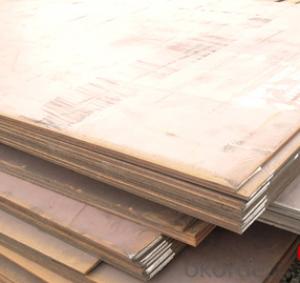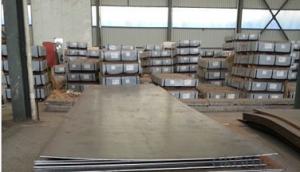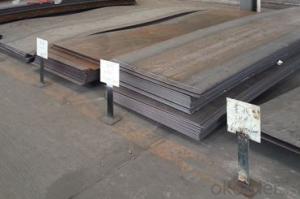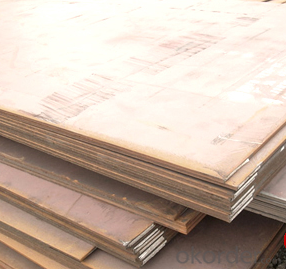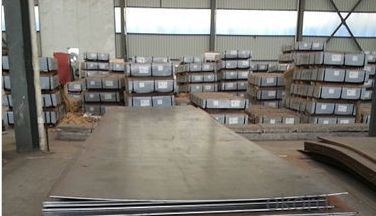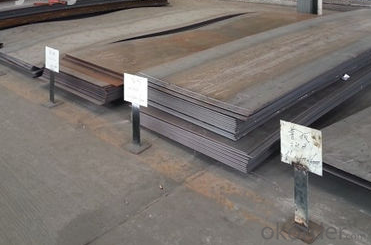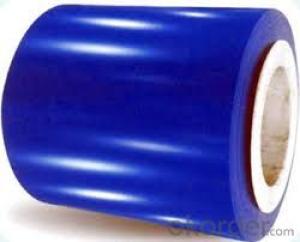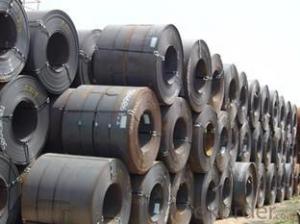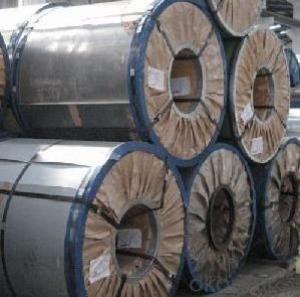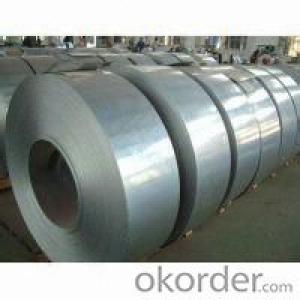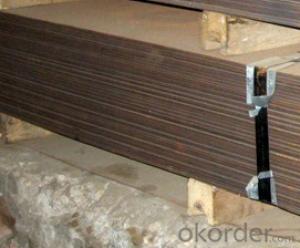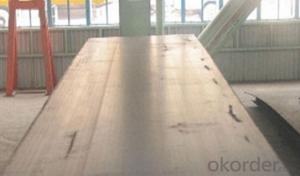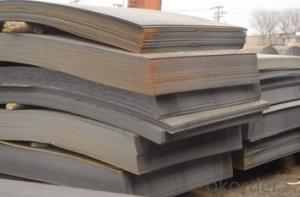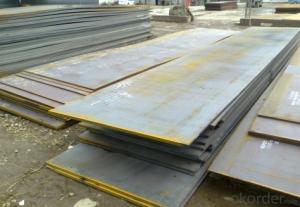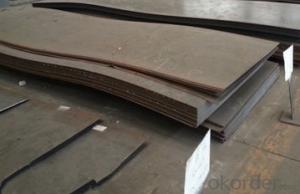Hot Rolled Carbon Steel Sheet SS400 CNBM
- Loading Port:
- Qingdao
- Payment Terms:
- TT OR LC
- Min Order Qty:
- 10 pc
- Supply Capability:
- 30 pc/month
OKorder Service Pledge
Quality Product, Order Online Tracking, Timely Delivery
OKorder Financial Service
Credit Rating, Credit Services, Credit Purchasing
You Might Also Like
Quick Details
| Standard: | AISI, ASTM, DIN, GB, JIS | Grade: | A572,A573,A633,A678,A709,A710,G3101,G3136,etc | Thickness: | 1mm-200mm |
| Brand Name: | SHOU GANG GROUP, AN STEEL | Model Number: | Q235 | ||
| Type: | Steel Plate | Technique: | Hot Rolled | Surface Treatment: | Coated |
| Application: | widely | Special Use: | High-strength Steel Plate | Width: | 1000mm-3000mm |
| Length: | 1000mm-12000mm | Price Term: | FOB CIF CFR |
Packaging & Delivery
| Packaging Details: | standard seaworthy export packing or as the request of customers |
| Delivery Detail: | 10 days after deposit or according to customers' quantity |
Specifications
hot rolled carbon steel sheet
1.Thickness:1mm-200mm
2.Length:1000mm-12000mm
3.Width:1000mm-2000mm
hot rolled carbon steel sheet
| Product | HR steel plate prices carbon steel plate prices per kg |
| MOQ | 25 ton |
| Thickness | 1mm-200mm |
| Width | 1000mm-3000mm |
| Length | 1000mm-12000mm |
| Application | widely |
| Standard | AISI,ASTM,BS,DIN,JIS,GB,etc |
| Grade | A572,A573,A633,A678,A709,A710,G3101,G3136,etc |
| Tpye | Steel plate |
| Surfacing | Coated |
| Productive Technology | Hot Rolled & Cold Rolled |
| Port | |
| Payment Terms | L/C,T/T,Western Union,MoneyGram |
| Product Ability | 5000 tons per month |
| Delivery | 10 days after deposit or according to customers' quantity |
| Packing | standard seaworthy export packing or as the request of customers |
- Q: Why can steel HPB300, steel plate without Q300, steel structure manuscript review, but also continued the Q235, why not improve it?
- Carbon steel according to the steel yield strength is divided into 5 grades: Q195, Q215, Q235, Q255 and Q275 of each grade because the quality is divided into A, B, C, D grade, with a maximum of four kinds, some only one; this is just plain carbon steel, the price is cheap, generally not heat treatment. Only quality carbon steel has the value of heat treatment.
- Q: Are steel sheets suitable for high-temperature applications?
- Yes, steel sheets are suitable for high-temperature applications due to their excellent thermal resistance and strength. Steel can withstand elevated temperatures without significant deformation or loss of strength, making it an ideal material for various industries such as automotive, aerospace, and manufacturing. Additionally, steel sheets can be further enhanced with heat-resistant coatings or alloys to enhance their performance in extreme heat conditions.
- Q: How do steel sheets perform in terms of fatigue resistance?
- Steel sheets are known for their outstanding fatigue resistance. Their high strength and durability allow them to endure repeated cyclic loading without experiencing significant damage or failure. This fatigue resistance is due to the material's capacity to absorb and distribute stress, effectively preventing the accumulation of cracks or fractures. Moreover, the fatigue resistance of steel sheets can be further enhanced through various heat treatment methods, like quenching and tempering, which improve their fatigue resistance properties. As a result, steel sheets are frequently chosen for applications where fatigue resistance is crucial, particularly in the automotive and aerospace industries, as they can endure prolonged and repeated loading without compromising their structural integrity.
- Q: Can steel sheets be used for elevator shafts?
- Yes, steel sheets can be used for elevator shafts. Steel is a common material choice for elevator shafts due to its strength, durability, and fire resistance properties. It can be fabricated into sheets and used to construct the walls and structure of elevator shafts, providing a safe and reliable transportation system.
- Q: Are the steel sheets available in different grades?
- Different grades of steel sheets are available. Steel is categorized into various grades depending on its composition, strength, and other properties. These grades encompass carbon steel, stainless steel, alloy steel, and tool steel, among others. Each grade possesses distinct characteristics and is appropriate for different applications. The selection of a grade relies on factors such as the desired strength, resistance to corrosion, and cost-effectiveness for the particular use. Consequently, when buying steel sheets, it is crucial to take into account the grade that most effectively meets the intended purpose.
- Q: Are steel sheets suitable for automotive chassis?
- Yes, steel sheets are suitable for automotive chassis. Steel is a popular choice for automotive chassis due to its strength, durability, and affordability. It provides excellent structural integrity and can withstand the various forces and stresses experienced by a vehicle during operation. Steel sheets also offer good resistance to impacts, vibrations, and corrosion, making them ideal for use in automotive chassis. Additionally, steel is a readily available material and can be easily formed, welded, and molded into different shapes and sizes, allowing for flexibility in design and manufacturing processes. Overall, steel sheets are a reliable and widely used material in the automotive industry for constructing chassis that meet the required safety, performance, and longevity standards.
- Q: How thick are steel sheets typically?
- Steel sheets can vary in thickness depending on their intended use, but they are typically available in thicknesses ranging from 0.5mm to 6mm for general applications.
- Q: Can steel sheets be used for food processing equipment?
- Yes, steel sheets can be used for food processing equipment. Stainless steel is a popular choice for food processing equipment due to its durability, corrosion resistance, and ease of cleaning. It is non-reactive with food and does not impart any unwanted flavors or odors. Steel sheets can be formed into various shapes and sizes, making them suitable for different types of food processing equipment such as mixers, conveyors, tanks, and cutting blades. Additionally, stainless steel is also resistant to high temperatures, making it ideal for applications that involve heat. Overall, steel sheets are a reliable and hygienic material choice for food processing equipment.
- Q: Can steel sheets be heat treated for increased hardness?
- Steel sheets have the capability to undergo heat treatment in order to enhance their hardness. Heat treatment serves as a method to modify the physical and mechanical properties of steel, specifically hardness. The most commonly employed heat treatment technique for augmenting the hardness of steel sheets is known as quenching and tempering. Throughout this process, the steel sheets are subjected to high temperatures and then rapidly cooled by quenching in a suitable medium, such as oil or water. This rapid cooling facilitates the alteration of the steel's microstructure, ultimately resulting in increased hardness. However, it is worth noting that this abrupt cooling may also introduce internal stresses to the steel, rendering it brittle. To counteract this brittleness, the quenched steel sheets are subsequently tempered by reheating them to a specific temperature and maintaining this temperature for a designated period. Tempering enables the steel to regain some of its ductility while still retaining the desired hardness. It is crucial to acknowledge that the precise heat treatment process and parameters employed for steel sheets are contingent upon the composition and intended application of the steel. Different steel alloys necessitate distinct heat treatment procedures, and as a consequence, the temperature and time parameters may vary accordingly. Consequently, it is vital to seek advice from an expert or refer to the steel's technical specifications to ascertain the appropriate heat treatment process for achieving the desired hardness.
- Q: What are the different thickness gauges available for steel sheets?
- There are several thickness gauges available for steel sheets, including the commonly used gauges such as 18, 20, 22, 24, and 26 gauge.
Send your message to us
Hot Rolled Carbon Steel Sheet SS400 CNBM
- Loading Port:
- Qingdao
- Payment Terms:
- TT OR LC
- Min Order Qty:
- 10 pc
- Supply Capability:
- 30 pc/month
OKorder Service Pledge
Quality Product, Order Online Tracking, Timely Delivery
OKorder Financial Service
Credit Rating, Credit Services, Credit Purchasing
Similar products
Hot products
Hot Searches
Related keywords
